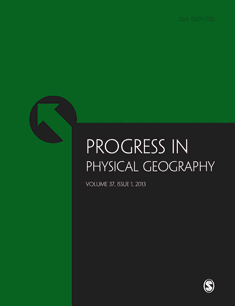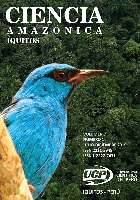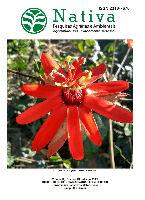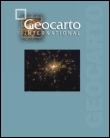
Geography and Natural Resources
Scope & Guideline
Connecting Scholars to the Heart of Natural Resource Issues
Introduction
Aims and Scopes
- Environmental Change and Climate Dynamics:
Research on how natural and anthropogenic factors influence environmental changes, including climate variability, ecosystem dynamics, and their implications for biodiversity and natural resource management. - Natural Resource Management:
Studies that explore the sustainable use and management of natural resources, including water, soil, and biodiversity, with a focus on developing strategies for conservation and restoration. - Geoecological Assessments:
Analyses that assess the ecological status of various geographical regions, including evaluations of land use impacts, pollution levels, and ecosystem health. - Socioeconomic Interactions:
Investigations into the socioeconomic factors affecting natural resource use, including the impacts of human activities, economic policies, and demographic changes on geographical areas. - Geospatial Technologies:
Utilization of remote sensing, GIS, and other geoinformatics tools to study landscape changes, resource distribution, and environmental monitoring.
Trending and Emerging
- Climate Change and Its Impacts:
Recent publications have increasingly addressed the impacts of climate change on various geographical and ecological systems, highlighting the urgency of understanding these effects on natural resources. - Microplastics and Pollution Studies:
Research on microplastics and other pollutants in various ecosystems is gaining traction, reflecting a growing awareness of environmental pollution and its consequences for health and biodiversity. - Sustainable Development Practices:
There is a notable increase in papers discussing sustainable development strategies, particularly in relation to natural resource management and conservation efforts in vulnerable regions. - Interdisciplinary Approaches to Geography:
Emerging themes reflect a trend towards interdisciplinary research, integrating perspectives from ecology, economics, and social sciences to address complex geographical issues. - Geoecological Modeling and Assessments:
There is a rise in the application of advanced modeling techniques to assess environmental changes and resource management strategies, indicating a shift towards data-driven approaches in geographical research.
Declining or Waning
- Historical Geography of Settlements:
Research in this area, particularly studies focusing on the historical and geographical features of settlement patterns, appears to be declining, possibly due to a shift towards more contemporary issues in geography. - Traditional Land Use Practices:
Papers focusing on traditional land use practices and their historical context are less frequent, indicating a waning interest in purely anthropological or historical approaches without contemporary applications. - Geopolitical Analyses of Regional Conflicts:
The exploration of geopolitical tensions and conflicts, particularly those that do not directly relate to environmental issues, is becoming less prominent, as the journal’s focus shifts more towards sustainability and ecological assessments.
Similar Journals

Ecological Indicators
Shaping the future of ecology with cutting-edge findings.Ecological Indicators, published by Elsevier, is a prestigious journal dedicated to advancing the fields of ecology and environmental science. With an impressive impact factor and ranked in the Q1 quartile for both Ecology and Decision Sciences categories, the journal serves as a vital resource for researchers and professionals aiming to apply ecological knowledge to real-world problems. The journal covers a broad scope of topics within ecological indicators, aiming to provide comprehensive insights into biodiversity, ecosystem health, and sustainability metrics. Founded in 2001 and continuing through 2024, Ecological Indicators has established itself as a leader in disseminating significant research and innovative findings. The journal's standing is reflected in its remarkable Scopus ranks, placing it among the top percentile in its respective categories. Authors are encouraged to submit their work to share vital findings with an engaged audience of researchers, professionals, and dedicated students, ensuring the continued relevance and impact of ecological research on global environmental policies and practices.

Progress in Physical Geography-Earth and Environment
Empowering scholars to navigate Earth’s changing landscapes.Progress in Physical Geography-Earth and Environment is a premier academic journal published by SAGE Publications Ltd, renowned for its contributions to the fields of Earth and Planetary Sciences and Geography. With a distinguished history spanning from 1977 to 2024, this journal maintains a robust Q1 classification in both Earth and Planetary Sciences and Geography, Planning and Development, reflecting its high impact and rigorous scholarly standards. As evidenced by its Scopus rankings, it stands at the forefront of research, positioned in the 89th percentile among leading journals. Progress in Physical Geography aims to facilitate the exchange of innovative research, insights, and methodologies, making it an essential resource for researchers, professionals, and students dedicated to understanding and shaping the natural environment. While currently not designated as an Open Access journal, the wide accessibility of its content, combined with its significant impact factor, underscores its importance within the academic community seeking to advance knowledge and application in geography and environmental sciences.

Journal of Mountain Science
Elevating Research on Sustainable Mountain DevelopmentThe Journal of Mountain Science, published by SCIENCE PRESS, is a distinguished academic journal dedicated to advancing the understanding of mountain environments and their significance in various scientific domains. With an ISSN of 1672-6316 and an E-ISSN of 1993-0321, this journal has carved a niche in the field of Earth sciences, earning a commendable Q2 ranking in categories such as Earth-Surface Processes, Geography, Planning and Development, and Geology, as well as a Q3 ranking in Global and Planetary Change. Since its inception in 2007, the journal has been pivotal in fostering interdisciplinary research that addresses critical environmental issues, making it an essential resource for researchers, professionals, and students alike. While currently not offering open access, it provides valuable insights into areas including nature conservation and landscape management, with a focus on the unique challenges faced by mountainous regions. Located in Beijing, China, the Journal of Mountain Science continues to promote scholarly discourse that contributes to the sustainable development of mountain communities and ecosystems until 2024 and beyond.

Southeastern Geographer
Navigating the Complexities of Southeastern LandscapesThe Southeastern Geographer is a prominent academic journal published by the Association of American Geographers, dedicated to advancing knowledge in the fields of Earth and Planetary Sciences and Geography, Planning and Development. With an ISSN of 0038-366X and an E-ISSN of 1549-6929, this journal has been a staple in geographical scholarship since its inception, offering a platform for diverse research that spans over four decades, specifically from 1979 to 1994 and then from 1996 to 2024. The journal is currently classified in the Q3 category within its fields, indicating its significant influence in shaping contemporary geographical discourse. Researchers, professionals, and students alike benefit from its rigorously peer-reviewed articles that explore regional studies, environmental issues, and sociocultural dynamics, making it essential for anyone interested in the interconnectedness of geography and society. As a vital resource for advancing geographical education and research, the Southeastern Geographer continues to engage its audience with innovative insights and scholarly contributions.

Ciencia Amazonica
Unveiling the Wonders of the Amazon: Research for a Greener FutureCiencia Amazonica is a prominent academic journal dedicated to the exploration and dissemination of research pertaining to the Amazon region, reflecting the rich biodiversity, cultural heritage, and environmental challenges that characterize this unique ecosystem. Published by UNIV CIENTIFICA PERU, this journal has embraced an Open Access model since 2011, ensuring that valuable scientific findings are freely accessible to researchers, professionals, and students worldwide. With its commitment to fostering collaborative research and dialogue, Ciencia Amazonica serves as an essential platform for sharing innovative studies, fostering conservation efforts, and promoting sustainable development practices within the Amazon Basin. As the journal continuously seeks to engage with critical issues faced by this vital region, it is a crucial resource for anyone interested in the complex interplay of ecology, social sciences, and environmental policy in the Amazon.

Nativa
Championing open access to vital agricultural research.Nativa, published by the Universidade Federal de Mato Grosso in Brazil, stands as a prominent open-access journal since 2013, dedicated to the dissemination of research across various domains of Agricultural and Biological Sciences. With its ISSN 2318-7670, Nativa aims to foster scholarly communication and collaboration among researchers and practitioners worldwide. The journal occupies notable positions within the Scopus rankings, with a Q3 classification in several categories, including Agricultural and Biological Sciences (miscellaneous) and Environmental Science (miscellaneous), while also holding a Q4 classification in areas such as Agronomy and Crop Science and Animal Science and Zoology. This positioning reflects its commitment to advancing knowledge and understanding crucial to sustaining and enhancing our natural resources. Nativa seeks to engage a diverse readership by providing a platform for innovative research, fostering interdisciplinary discourse, and addressing pressing environmental challenges and conservation efforts essential for sustainable development.

Geocarto International
Bridging Disciplines for a Sustainable FutureGeocarto International is a premier peer-reviewed journal published by Taylor & Francis Ltd that focuses on the intersection of geography, planning, and environmental science, offering valuable insights into emerging research trends and methodologies within these fields. With an impressive impact factor, the journal is consistently recognized for its contributions, ranked in the Q1 category for Geography, Planning, and Development as well as Q2 in Water Science and Technology as of 2023. Geocarto International not only showcases high-quality research articles but also embraces Open Access publishing since 2023, promoting accessibility and fostering a global dialogue among researchers, professionals, and students. Spanning over three decades from its inception in 1986 to 2024, the journal continues to serve as an essential platform for disseminating knowledge, advancing scholarly communication, and addressing crucial environmental challenges across the United Kingdom and beyond. Explore the latest advancements and contribute to the dynamic discussions shaping the future of geography and environmental sciences through Geocarto International.

Geoadria
Sharing Pioneering Research in Open Access FormatGeoadria, an esteemed Open Access journal published by the University of Zadar in Croatia, has been at the forefront of disseminating valuable research since its inception in 1996. With a keen focus on atmospheric science, demography, earth-surface processes, and geography, this journal serves as a crucial platform for researchers and professionals aiming to explore the intricate relationships between these fields. Although it currently holds a Q4 quartile ranking in various categories, such as Atmospheric Science and Geography, its commitment to promoting innovative scholarly dialogue ensures its relevance and utility within the academic community. Geoadria is indexed in Scopus, with rankings that reflect its ongoing contribution to the social sciences and earth sciences, notably garnering attention in niche areas. With a dedication to open access since 1996, the journal stands as a testament to the University of Zadar's commitment to enhancing global knowledge. Researchers, professionals, and students interested in geography, demography, and environmental sciences will find Geoadria a vital resource for the latest empirical studies and theoretical discussions.

SaberEs
Connecting scholars to drive progress in economic sciences.SaberEs is an esteemed open-access journal dedicated to advancing knowledge in the fields of economics and statistics. Published by the Universidad Nacional de Rosario, Facultad de Ciencias Económicas y Estadística, this journal offers a platform for researchers, professionals, and students to disseminate their findings and engage in scholarly discourse. Since its inception in 2009, SaberEs has made significant contributions to the academic community by promoting rigorous research and critical analysis. With its commitment to accessibility, the journal ensures that its articles are freely available to a global audience, emphasizing the importance of shared knowledge in fostering progress within economic and statistical sciences. Researchers looking to explore innovative methodologies and application-focused studies will find SaberEs to be an invaluable resource in their academic endeavors.

Physio-Geo
Bridging Gaps in Environmental ResearchPhysio-Geo (ISSN: 1958-573X) is a distinguished open-access journal published by REVUES ORG, dedicated to advancing the fields of Earth and Planetary Sciences, with a special focus on Earth-Surface Processes, Environmental Science, and Ecology. Since its inception in 2007, Physio-Geo has provided a platform for researchers, professionals, and students to disseminate and access high-quality studies that contribute to the understanding of our environment. With a convergence period from 2019 to 2024, the journal aims to bridge disciplinary gaps and foster interdisciplinary research that addresses pressing ecological and environmental challenges. Despite its current Scopus rankings reflecting an early-stage development, the journal is poised to enhance its impact within the scientific community, particularly as it embraces a wider audience through its open-access model. By offering valuable insights and comprehensive analyses, Physio-Geo is an essential resource for those seeking to explore the complex interactions between physical geography and ecological systems.